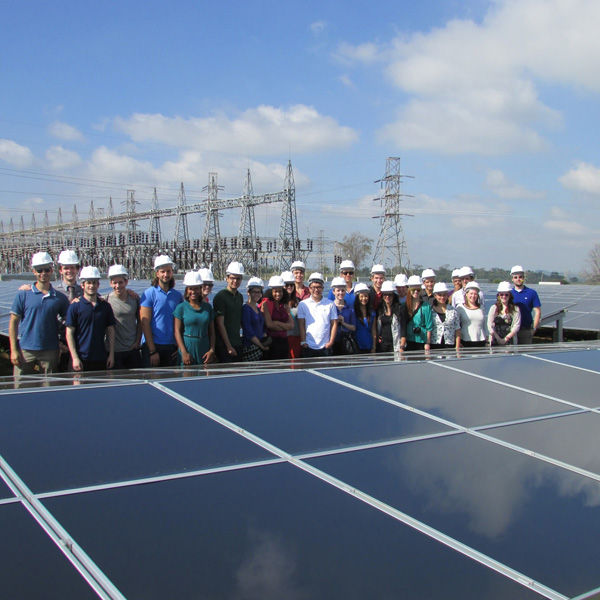Students explore Brazil’s renewable energy sector

Generating renewable energy from natural resources such as wind, sunlight, and geothermal heat could save us from an impending energy crisis, according to Arturo Avila, a second-year student studying civil and environmental engineering.
“The smartest thing to do is to start thinking about alternatives to fossil fuels so we can have other options to power the globe,” he explained, noting that world’s supply of oil, coal, and gas will eventually run out.
Avila is one of more than 20 undergraduate students who recently returned from a Dialogue of Civilizations program in Sao Paulo, Brazil, one in which a cross-disciplinary crew of biology, engineering, anthropology, and international affairs majors explored the country’s robust renewable energy sector. According to research conducted by the Energy Research Corp., renewable energy accounts for more than 85 percent of Brazil’s domestically produced electricity.
Courtney Pfluger, an assistant academic specialist in the College of Engineering, led the monthlong dialogue, which dovetailed with Northeastern’s focus on discovering solutions to global challenges in health, security, and sustainability. “The students can take the knowledge of how renewable energies work and the policies that helped implement them in Brazil and hopefully use that to encourage the growth and engineering of these technologies in the U.S.,” Pfluger said.
The dialogue comprised site visits to power plants of the hydroelectric, solar, and landfill gas variety as well as courses on alternative energy technologies and Brazilian culture. Students learned how to speak basic Portuguese, visited historical museums, and even tried Capoeira, a Brazilian martial art combining elements of dance, music, and acrobatics.
Each student was required to blog about the experience. In one post, fourth-year anthropology major William Wilson weighed the pros and cons of alternative energy sources from a social, environmental, and economic perspective. Hydroelectric dams, he wrote, often disrupt migratory fish cycles and lead to groundwater contamination. “But these seem to be the ‘small-scale’ impacts,” he added. “Worries of larger magnitudes include interborder disruption of water flow, which can inevitably lead to serious multinational turmoil. Then there’s the question of who gets the electricity: Does it go to the industrial sector or to the residential sector?”
Learning about renewable energy in Sao Paulo convinced both Wilson and Avila to make sustainability a key component of their future work. Avila plans to return to Brazil to complete an international co-op in the renewable energy sector. Wilson wants to attend graduate school to study urbanization in developing countries. “You wonder how we’re supposed to provide electricity and water for 9 billion people when you hear that the demand for energy will double by 2030,” he said.





